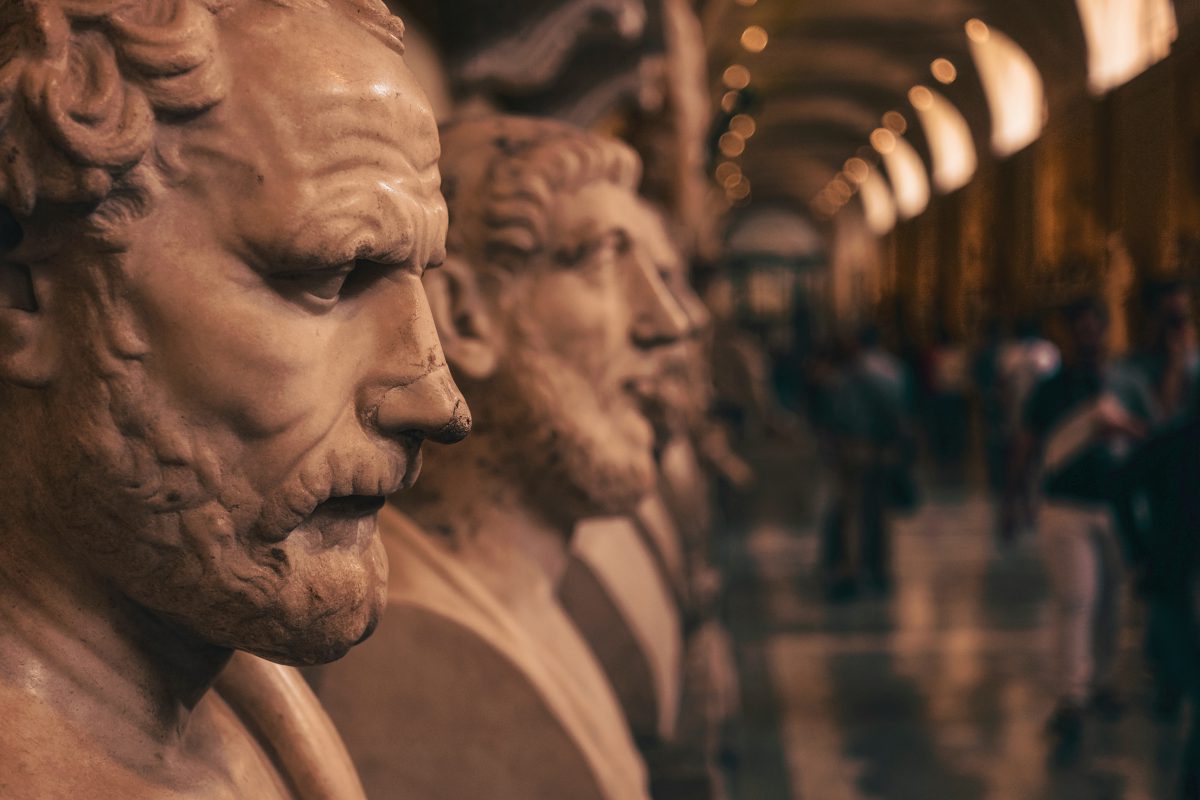Classics Series
Is Western Civilization Uniquely Bad?
If we are looking for a civilization that never engaged in mass violence or destruction, we’re unlikely to find one.

This is part three of a four-part series on the Classics.
Even if the concept of Western civilization isn’t inherently incoherent, some would argue that we should still be extremely cautious of it, or maybe even avoid it altogether, because of the way Western nations have engaged in various sorts of racism, war-mongering, and imperialistic exploitation. On this view, the legacy of the West is irredeemably tainted, and we should either steer clear of it altogether, or, if we have to teach it, we should teach it in an openly and self-consciously critical way.
Now, it’s impossible to deny that Western nations have done some terrible things. From the Spanish looting of the Inca Empire, to the British massacre of Indian civilians at Amritsar, the list of Western depredations is long. Violence within the West, and among Western nations, has been just as horrific, from the eight million or so deaths caused by the Thirty Years’ War to the 60 or 70 million fatalities of World War II.
The problem is, though, that if we are looking for a civilization that never engaged in mass violence or destruction, we’re unlikely to find one. The Warring States period in China was one of the bloodiest in history. The rapid spread of Islam in the seventh and eighth centuries wasn’t any more peaceful than the Christian crusades. Scrupulously pacifist cultures are hard to find, for an obvious reason—in a violent world, those who refused to fight back were liable to be eliminated, as the peace-loving Moriori of the Chatham islands nearly were in the 1830s.
At this point, it might be argued that only in the West was the cultural tradition intimately bound up with violence in a way that supported imperialistic ventures. Some of the West’s most foundational texts are relentlessly violent, like the Iliad, or openly imperialistic, like the Aeneid. And the influence of such works wasn’t confined to literature: the Spanish conquistadores found a ready justification of their treatment of native peoples in Aristotle’s doctrine of natural slavery, and British imperialists were still quoting endorsements of empire from Vergil in the 19th century. Should we really be having students read these same texts in the modern day?

The problem is that if we answer ‘no’ to this question, it quickly becomes apparent that there is virtually no civilization whose texts we can read. Other cultures, reared in worlds that were no less violent than the West, also produced texts that are full of violence, like the Bhagavad Gita, or that were guides to military conquest, like The Art of War. The Koran is no less violent than the Old Testament; and the New Testament is a reminder that texts that are part of the Western tradition can contain strongly pacifistic ideas, just as non-Western texts can. If the crusaders or the armies of the Thirty Years’ War found support for their violence in Christianity, Zen Buddhism provided just as much support to the equally violent imperialists of 20th century Japan.
Considering how difficult it is to find civilizations that completely rejected violence and imperialism either in their actions or in their cultural productions, it might occur to us that the West’s tendencies in this direction are not unique. What the historical record suggests, in fact, is that pretty much all cultures that we know of have been trying to beat other people up and take their stuff for the whole of human history. The fact that Western nations have, for the past two or three hundred years, done the lion’s share of these two activities probably isn’t then simply a result of Westerners being uniquely evil, or having a particularly nefarious cultural tradition. It’s more likely a result of the fact that, for a brief period of history which is now ending, Western nations were markedly better than their rivals at violence and conquest.
Why this came to be the case is one of the great historical questions, and, unsurprisingly, a number of explanation have been put forward. Maybe Western dominance has always been inevitable because the ancient Near East had more crops that were easy to domesticate than other parts of the world, meaning that agriculture and everything that flowed from it (dense populations, complex states, and so on) came to the Western part of Eurasia earlier than it did to the Eastern part. Maybe it was the fact that Europe was so much closer to the New World than China was, which allowed Europeans to reap the windfall of American gold and silver before the Chinese did. Maybe institutions that gradually limited the power of monarchs and increased stability and credit-worthiness played a role, as did the emerging scientific culture of the Enlightenment, and the technological advances it brought with it. Or maybe the dominance of the West was really only put beyond doubt after the Industrial Revolution, which led to an unprecedented and sustained explosion in economic growth. (And why the Industrial Revolution happened in England and not anywhere else first is a great historical question in itself.)
Whichever of the explanations, or whatever combination of them, best explains what’s become known as “the Great Divergence” between West and East through the 18th and 19th centuries, one thing is clear: One of the old answers, the one that seemed obvious to many Western imperialists, is almost certainly wrong. Westerners didn’t take over the globe because their racial makeup made them inherently superior; as subsequent history has shown, non-Westerners are just as capable of sustaining wealthy, complex societies, or of making use of advanced technology, as Westerners.
But there’s another argument that’s also almost certainly wrong that, far from being left behind, has become almost hegemonic of late. This argument is the reverse of the one we’ve just considered: It holds that, rather than being uniquely virtuous, the West took over because Westerners were uniquely violent and rapacious. As we’ve seen, even a cursory perusal of the historical record reveals this not to be the case. Virtually all of the civilizations we know of have had a tendency to want to dominate and exploit their neighbors. And, in virtually all of them, cultural productions have tended to old the mirror up to the world they were formed in, so that violent and chauvinistic texts can be found pretty much everywhere too.
If we reject the study of Western civilization because of the violence that has often been part of it, we might be forced to reject the study of all other civilizations too. If the suggestion is simply to teach Western civilization in a self-consciously critical and cautionary way, consistency would seem to demand that we also teach Chinese and Islamic civilization with similar disclaimers. The solution would seem obvious: to teach all of these different traditions and histories in a neutral and objective way, and, when praise or censure seem appropriate, to mete it out equally to Western and non-Western cultures as necessary.
But there’s one further point that we can now make about Western civilization and the crimes of the West. Look back at the list of factors that have been put forward for the astounding military and economic superiority that the West achieved in the modern period. How many of them have to do with the distinctive character of Western literature and philosophy? Not many. And that shouldn’t be surprising, because if it really was (say) the transformation of the Western European economy that really enabled the West to take over, it’s hard to see what room is left for the role of books. In any case, as we’ve already seen, lots of cultures had violent books; only the West was able to play out the despicable ideas contained within them on a global stage.
Of course, violence wasn’t the only thing that the Westerners’ books contained; some of them also contained philosophies that stressed empiricism, not to mention scientific discoveries that were the fruit of empirical methodologies. How much of a role they played in the West getting ahead is up for debate (after all, there were a lot of books in Chinese and Arabic that had some things to say about science too, and China and the Islamic world were nevertheless left behind.) But it’s certainly possible to tell a story about how the particular set of scientific ideas found in Western culture, especially during the Enlightenment, paved the way for the Industrial Revolution as well as the West’s successful exploration (not to mention conquest) of distant lands. (Indeed, that’s a story that’s been told more than a few times.)
But if this is a story about scientific and technical achievement, it’s not clear what part the canon of largely literary works that tend to be taught as “Western Civ” have in it. It’s easy to see what role the works of Adam Smith or even Newton or Hume might have played in industrialization; Plutarch and Dante, not so much. The economic historian Joel Mokyr has even suggested that it was precisely the relatively weak position that the classics held in Western countries that helped them achieve greater economic progress than China, where an elite class of scholar-bureaucrats held sway until the beginning of the 20th century.

That’s not to say that the Western classics had an entirely conservative role. Of course, they often were a break on progress, and progress often took the form of breaking with them. Descartes and Galileo made major advances in our understanding of the world by rejecting Aristotle; Darwin did by implicitly rejecting the teachings of the Bible (or, at least, a literal interpretation of them). But the classics could be progressive too: the example that springs into my mind is the role that Athenian democracy played as a positive model for the liberal “Philosophical Radicals” of 19thcentury England.
There’s a larger point, though, and that’s one that might seem somewhat deflating to teachers of classics or of Western Civ. It may be that the impact of the Western canon on how world history has played out over the last few centuries has been enormously exaggerated. Despite what’s sometimes implied, it’s unlikely that there’s any kind of causal relationship between Ovid’s Metamorphoses and the development of the spinning jenny, or between Juan de la Cruz and the gatling gun.
That doesn’t mean that Western literature isn’t worth reading, or teaching (or that it doesn’t make sense to teach it as part of a single tradition). It’s worth reading for all the reasons that humans have read literature since time immemorial: Because it’s often entertaining, instructive, and sometimes even meaningful. If Western literature probably didn’t power the Western takeover of huge swaths of the globe, that may not be such a bad thing. It may even allow us to read Western literature once again as it was for the most part intended to be read—as literature.






